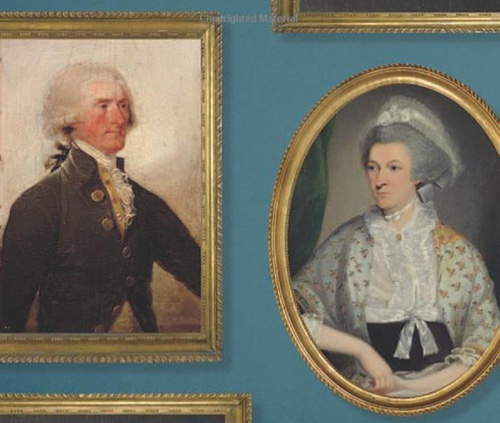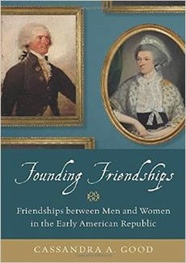Is This an Answer to Our Hookup Culture?

It isn’t often that an historian writes a book that is an authentic and original exploration of the past – – and simultaneously comments on the cultural world of 2015. Cassandra Good has accomplished this feat in her new book, Founding Friendships which deals with relationships between men and women in the early American republic. But Ms Wood leaps boldly into the 21st century when she uses as a touchstone the 1989 film, “When Harry Met Sally.” As those who saw the movie may remember, Harry is sharing a ride from Chicago to New York with Sally. They begin discussing friendships between men and women. Harry declares the very idea is impossible because “the sex part always gets in the way.”
 Those
words will resonate with a great many people under the age of 40.
These are the people who have experienced what many people call our
hookup culture. The other day I read an account of how a well –
known college in Maine welcomes new students. The senior class put
on a series of skits making it clear that in their wonderful campus
world anything goes. Restraint has vanished. In this approach to
male-female relationships, sex not only gets in the way – – it is
the way. The idea of friendships between men and women is reduced to
triviality --perhaps even to absurdity.
Those
words will resonate with a great many people under the age of 40.
These are the people who have experienced what many people call our
hookup culture. The other day I read an account of how a well –
known college in Maine welcomes new students. The senior class put
on a series of skits making it clear that in their wonderful campus
world anything goes. Restraint has vanished. In this approach to
male-female relationships, sex not only gets in the way – – it is
the way. The idea of friendships between men and women is reduced to
triviality --perhaps even to absurdity.
In her book, Cassandra Good shows us how a long time ago Americans thought it was possible for men and women to be friends without sex getting in the way. They thought friendships could flower in spite of sexual differences -- and even be enriched by them. Perhaps I am amenable to this idea because I have explored it in another culture. When I wrote my biography of Benjamin Franklin, The Man Who Dared The Lightning, I discovered that John Adams was a forerunner of Harry and his conviction that sex always got in the way. Honest John, as he called himself, was convinced that the 78 year old Franklin was having sex with each and every one of the numerous women who exchanged kisses with him at the salons he attended in Paris. No one managed to explain to John that the French had a term for the relationships that Franklin was pursuing with these often influential women. It was called amite amouresse -- friendship love.
This term never became part of the founding era relationships that Ms Good discusses. The Americans of these years relied on the leading ideas of the new nation – – virtue, freedom, and equality. The appeal on the freedom side was especially strong. For a woman, the choice of a spouse often required paternal approval. After marriage, a woman’s freedom was even more limited. A husband had almost complete control of a wife’s personal wealth and felt free to censor and/or direct her actions in almost every imaginable situation. But men and women could befriend each other without anyone’s approval.
Perhaps most important, there were no formal patterns to which anyone was required to adhere. Both the man and the woman realized that they were exploring new territory. Another factor was the power of the term friend. Francis Bacon, the English philosopher whose essays exerted a profound influence on many people, wrote: “a man cannot speak to his son but as a father, to his wife but as a husband…. Whereas a friend may speak as the case requires.” The candor – perhaps honesty would be a better word – that friendships presumed frequently added a sense of adventure to these mixed sex relationships.
One of the most common topics that absorbed the attention of both sexes was love. A young man already in love with an attractive woman often struck up a friendship with one of her friends who advised him on how to proceed. In Maryland during 1803 and 1804, Ann Pinckney became John Rodgers’s advisor and friend in his pursuit of attractive Minerva Dennison. A Commodore in the U.S. Navy, Rodgers fell in love with Minerva at a dinner party in 1802. He wrote his old friend Ann that his heart continued to play “the tune of Minerva” in spite of frequent storms of English, Italian, and Spanish beauty, which threatened to wreck his constancy during his long voyages.
Ann told Rodgers that Minerva was rejecting him because she felt she was too young to marry. But Ann comforted him by reporting that there was no immediate competition for Minerva’s love. Then came a moment in which in Ann’s role was crucial. Shortly before he embarked on another voyage, Rodgers visited Minerva and found her still cool and distant. Later, she revealed to Ann that she had very strong feelings for Rodgers. She had concealed them because she felt he was going to sea and might never come back.
When Rodgers returned from his watery journey, Ann informed him that behind her cool façade Minerva’s feelings had changed. She had even told Ann she was “ready to confess her love.” Rodgers promptly wrote a letter that closed with the potent words, “eternally and incessantly yours.” In a few weeks the couple was engaged. They were soon happily married and had three children. Ann Pinckney remained a friend and frequent visitor.
Around 1800, numerous popular writers a began arguing in favor of friendships between unmarried men and women. They made it clear that they were aware that this was a new phenomenon. They noted that in the ancient world women were generally considered unfit for friendship. Philosophers such as Plato and Aristotle thought friendship could be created only by “men of the greatest virtue, generosity, truth and honor.” Well into the 18th century , the idea that women could be friends was viewed with suspicion. In 1779 William Alexander pointed out in his History of Women that “Montaigne, who was much celebrated for his knowledge of human nature, has given it positively against the women and his opinion has been generally embraced.”
William Alexander did not agree. “Friendships with women are more rare than among men; but, at the same time, it must be allowed that where it is found, it is more tender.” This increase in the value of a women’s friendship soon led to the idea that unmarried men could benefit from female companionship.
One of the most influential British writers of the era, Lord Kames, Henry Home, wrote that while women were treated like animals in primitive societies they were now considered “delicious companions and incorruptible friends.” He saw this “mixed sex society” as a sign of historical progress; it would refine men and strengthen the self-confidence of women.
One of the most popular advice books of the era, John Gregory’s A Father’s Legacy to His Daughters, urged women to contract friendships with men whenever possible. Gregory argued that a man’s friendship for women “is always blended with a tenderness, which he never feels for one of his own sex, even where love is in no degree concerned.” The differences between men and women, in Gregory’ s opinion, reinforced the importance of their friendships. Then he added with not a little sternness that all of these observations were to be applied “with great caution.” He discoursed at some length about the dangers women had to face when they pursued friendships with men.
To some extent this was superfluous advice. Unmarried man-woman friends were well aware that the “sex part” could become a dangerous presence in their relationship. Cassandra Good devotes an entire chapter to the novels of the era, which make it clear that sexual desire could get out of control and ruin a woman’s reputation. In Samuel Richardson’s Clarissa, one character explained, “friendship generally speaking … is too fervent a flame for female minds to manage.” But this sort of realism only made mixed sex friendships more attractive to many people. They took pride in their ability to deal with the potential dangers.
Today’s hookup culture has its own dangers. Its sheer pervasiveness is an intimidating problem. According to one study, the vast majority – more than 90% – of American college students say their campus is characterized by this casual approach to sex. Students believe about 85% of their classmates have hooked up. Not a few experts believe that these young people will face an intimacy crisis in their future relationships. For them sex and the complex emotions that create love have been decoupled.
However, the situation is not quite as serious as these statistics and opinions suggest. Other studies have concluded only 20% of students regularly hookup; perhaps 50% occasionally hookup and one third do not hook up at all. Most startling, about 25% of men and women graduate from college a virgin. These facts suggest that there is still a substantial number of young Americans who can enjoy friendships with the opposite sex without feeling compelled to hook up. These are the people who will find Founding Friendships a book worth reading.